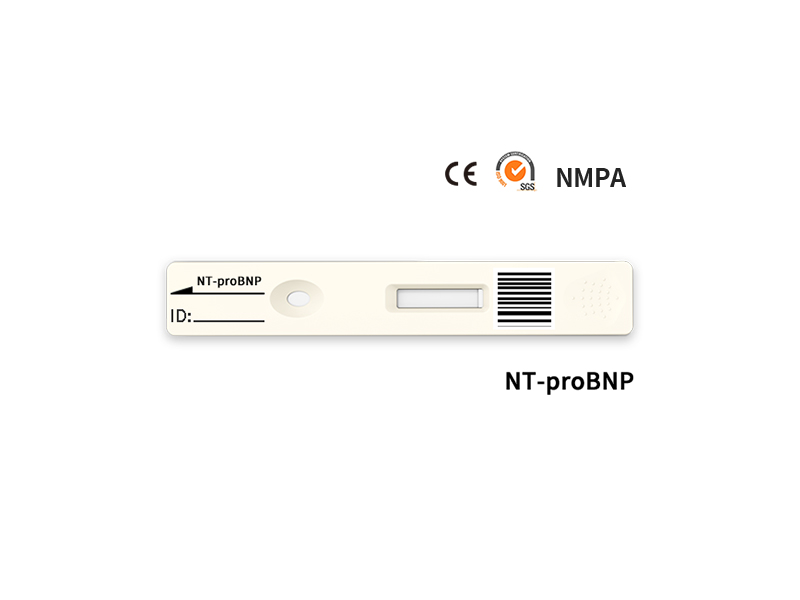NT-proBNP is a polypeptide mainly comes from ventricle. Cardiomyocytes synthesize a pre-propeptide preproBNP with 134 amino acids, which is split into a signal peptide and a propeptide (proBNP with 108 amino acids). During secretion from the cardiomyocytes, proBNP is split in a ratio of 1:1 into a physiologically active C-terminal fragment BNP (with 32 amino acids) and a biologically inactive N-terminal fragment NT-proBNP (with 76 amino acids). In physiologically, 70% of NT-proBNP is secreted by ventricle because of the large mass of ventricle. Aside from ventricle, NT-proBNP is also secreted by other organs such as brain, kidney, aorta and adrenal gland. However the level is far less than cardiac.It was advocated as a beneficial biomarker for evaluating HF by the American Association for Clinical Chemistry in 2007 and is allowed to be used for diagnosis and evaluation of HF and ACS by FDA. There is also evidence suggests that NT-proBNP has prognostic value in evaluating the increase of risk of cardiovascular disease and the mortality of stable coronary artery disease[1-3].
Product Specification
|
Specimen Types |
WB/Plasma/Serum |
|
Specimen Capacity |
WB:80μL; Plasma/Serum:50μL |
|
Reaction Time |
15 min |
|
Detection Range |
15-35000pg/mL |
|
Clinical Significance |
<75Years old,300-900pg/mL &
≥75Years old,450-1800pg/mL Low risk of HF
<75Years old,≥900pg/mL &
≥75Years old, ≥1800pg/mL High risk of HF
|
Advantages
√ The half-life is 90-120 minutes. In vitro stability, positive predictive value, and anti-drug interference effects are better than BNP. NT-proBNP is more sensitive than BNP in detecting early or mild heart failure√ Low sample requirements: whole blood can be processed without centrifugation
√ Equipped with special dropper consumables, more suitable for clinical operation scenarios
√ Used to distinguish cardiogenic and pulmonary dyspnea
√ Used to assess the degree of heart failure and predict the survival rate of patients with acute decompensated heart failure
ICU, CCU, Respiratory Medicine, Emergency Department, Cardiology, Emergency vehicle, Nursing home, Ambulance
Reference
1.Emdin M, Passino C, Prontera C, et al. Comparison of brain natriuretic peptide (BNP) and amino-terminal proBNP for early diagnosis of heart failure[J].Clin Chem,2007,53:1289- 1297.
2.Januzzi JL, Camargo C, Anwaruddin S, et al. The N-terminal pro-BNP investigation of dysp-nea in the Emergency Department (PRIDE) study[J].Am J Cardiol,2005,95:948-954.
3.Lan lan Wang, Bei Cai, Xing bin Liu, De jia Huang, Jiang tao Tang, Li xin Li. Clinical application and evaluation of N-terminal pro-Brain natriuretic peptide quantitative detection in heart failure laboratory diagnosis. Chin J Lab Med [J],January 2006, Vol 9, No.1.




 Gold supplier
Gold supplier









 Facebook
Facebook  Twitter
Twitter  Linkedin
Linkedin  YouTube
YouTube  Blogger
Blogger  Instagram
Instagram 
















